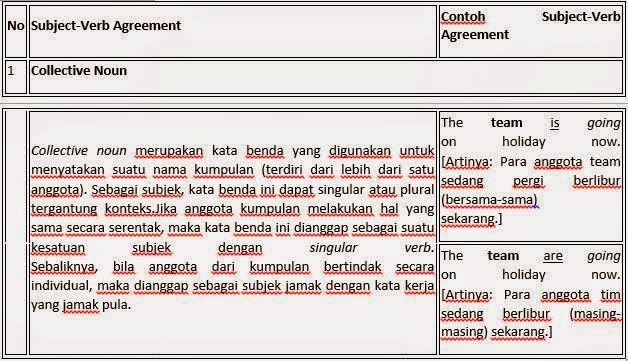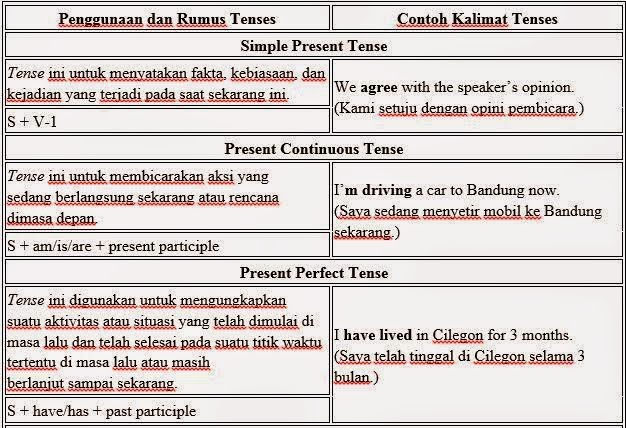VERB AS COMPLEMENT
Verb as Complement adalah kata kerja pelengkap ,
pelengkap kata kerja adalah kata atau frase yang melengkapi kata dari
subyek,obyek, atau kat kerja .Seperti, misalnya saya akan berusaha (1) untuk
bekerja keras (2), kawan saya memutuskan (1) untuk menikah (2) bulan depan,
adikku berhenti (1)menangis (2) ketika ibu datang, saya tak tahan (1)untuk
jatuh cinta (2) denganmu, dll.
PENGERTIAN GERUND
Gerund adalah suatu kata yang dibentuk dari verb
dengan ditambahkan suffix-ing dan berfungsi sebagai noun. Walaupun berfungsi
sebagai noun namun masih bertingkah seperti verb jika berada di dalam frasanya
(gerund phrase), seperti: diikuti direct object jika gerund berasal dari
transitive verb atau dibatasi maknanya dengan adverb.
Kata ini merupakan verbal, yaitu suatu kata yang
dibentuk dari kata kerja, namun berfungsi sebagai part of speech lain. Verbal
yang lain yaitu infinitive dan participle. Seperti verbal lainnya, kata ini
lebih umum untuk menamai action (aksi) atau state of being (keadaan).
Contoh : Swimming, walking, playing, building
Berikut adalah verbs yang langsung diikuti oleh
gerund (Verb + Gerund).
Note:
1. Verbs pada baris pertama selalu diikuti oleh gerund
(tidak pernah diikuti oleh infinitives).Can’t help di sini berarti “not able to
avoid a situation, or stop something from happening “.
2. Verbs pada baris kedua selain diikuti oleh gerund
juga dapat diikuti oleh infinitive dengan makna sama dengan bentuk gerund-nya.
(Lihat contohnya pada infinitive).
3. Verbs pada baris ketiga juga dapat diikuti oleh
infinitive, tetapi maknanya berbeda dengan bentuk gerund-nya. Lihat
contah 8, 9 & 10 dan bandingkan perbedaan maknanya dengan contoh pada
infinitive).
Contoh:
1. Has Ryan admitted killing eleven people yet? (Apakah
Ryan telah mengakui membunuh 11 orang?).
2. I appreciated being given suggestions by her. (Saya
menghargai diberi saran-saran oleh dia).
3. Tony always avoids answering my questions. (Tony
selalu menghindar menjawab pertanyaan-pertanyaan saya).
4. I enjoyed being with you last night. (Saya menikmati
bersama dengan kamu tadi malam).
5. Have you finished reading the book yet? (Apakah kamu
telah selesai membaca buku itu?)
6. They prefer playing football to studying. (Mereka
lebih milih/suka main sepakbola daripada belajar).
Note: Verb prefer jika
diikuti oleh gerund, pola kalimatnya berbeda dengan jika diikuti oleh
invinitive.
1. I can’t help worrying about the upcoming exam. (Saya
tidak bisa berhenti mengkhawatirkan ujian yang segera/sudah dekat itu).
2. I want to stop smoking. (Saya mau berhenti merokok).
Dalam kalimat ini, subject I berkeinginan untuk tidak merokok-merokok lagi.
3. My brother always remembers locking his car. (Kakak
saya selalu ingat mengunci mobilnya). Selama ini, mobilnya belum pernah dalam
keadaan tidak terkunci. Note: Gunakan gerund setelah verb remember jika
aktivitasnya sudah dilakukan in the past.
4. My brother never forgets locking his car. (Kakak
saya tidak pernah lupa mengunci mobilnya). Sama dengan contoh 7, selama ini,
mobilnya belum pernah dalam keadaan tidak terkunci. Note: Gunakan gerund
setelah verb forget jika aktivitasnya sudah dilakukan in the past.
Setelah prepositions
Sebelum diikuti oleh gerunds, prepositions (kata
depan) biasanya mengikuti verbs, adjectives, atau nouns. Perhatikan pola
berikut:
Verbs + prepositions + gerunds
Phrase pada table berikut adalah verbs +
prepositions yang selalu diikuti oleh gerund (tidak pernah diikuti oleh
infinitive.)
Note:
Walaupun diikuti oleh preposition to, phrase pada
baris kedua selalu diikuti oleh gerund. So, jangan dibingungkan dengan
infinitive.
Contoh:
1. He gave up smoking because of his doctor’s advice.
(Dia berhenti merokok karena saran dokternya).
2. Jenny insisted on buying that cellphone instead of
this one. (Jenny bersikeras untuk membeli HP itu daripada HP ini).
3. Have you ever thought of studying abroad? (Pernahkah
kamu berfikir untuk belajar di luar negeri?)
4. After a long trial and error, he finally succeeded
in fixing his laptop. (Setelah lama mencoba-coba, dia akhirnya berhasil
memperbaiki laptopnya).
5. My older sister objected to not being allowed to go
out wit her friends. (Kakak saya keberatan tidak diijinkan keluar rumah dengan
teman-temannya).
6. I am looking forward to seeing you soon. (Saya
(sedang) sangat menantikan untuk bertemu denganmu segera). INCORRECT jika: I am
looking forward to see you soon.
7. No one has confessed to stealing my money yet. (Tak
seorang pun yang telah mengaku mencuri uang saya). INCORRECT jika: No one has
confessed to steal my money yet.
Adjectives + prepositions + gerunds
Phrase pada table berikut adalah adjectives +
prepositions yang selalu diikuti oleh gerund (tidak pernah diikuti oleh
infinitive.)
Contoh:
1. Will you be capable of finishing your work by noon
tomorrow? (Apakah kamu (akan) bisa menyelesaikan pekerjaanmu sebelum jam 12
siang besok?).
2. Are you afraid of sleeping in the dark? (Apakah kamu
takut tidur dalam keadaan gelap?).
3. I am tired of studying all day long. Let’s go out to
have fun. (Saya lelah (karena) belajar seharian. Ayo kita cari kesenangan di
luar).
4 .Judith is fond of singing while taking a shower.
(Judith gemar menyanyi ketika sedang mandi shower).
5. Bobby is accustomed to buying roses for his girlfriend.
(Bobby terbiasa membeli mawar untuk pacarnya).
Nouns + prepositions + gerunds
Phrase pada table berikut adalah nouns +
prepositions yang selalu diikuti oleh gerund (tidak pernah diikuti oleh
infinitive.)
Contoh:
1. The teacher gave us a choice of taking another exam.
(Guru itu memberi kita pilihan untuk mengikuti ujian lagi).
2. I am so sorry. I had no intention of hurting your
feeling. (Saya sangat menyesal. Saya tidak punya maksud untuk menyakiti
hatimu).
3. He always has an excuse for being late. (Dia selalu
punya alasan kenapa (dia) telat).
4. There is no possibility of recruiting new employees
during recession we are facing now. (Tidak ada kemungkinan untuk merekrut
pegawai baru selama resesi yang sedang kita hadapi sekarang).
5. Have you found the best method for improving your
English yet? (Apakah kamu sudah menemukan metode terbaik untuk meningkatkan
(kemampuan) bahasa Inggris kamu?)
6. Your reason for getting bad grades is a big
nonsense. (Alasan kamu kenapa nilai-nilai kamu jelek adalah omong kosong/bualan
belaka).
Gerunds as Modifiers
Sering kita temukan kalimat yang menggunakan
modifier berupa clause (i.e. prepositions + S + V). Jika subject dari main
clause dan modifier tersebut sama, subject dari modifier tersebut dapat
dihilangkan, tetapi verbnya berubah menjadi gerund.
Contoh:
1. After doing the homework, I will play football. =
After I do my homework, I will play football.
2. Cats usually snore while sleeping. = Cats usually
snore while they ( the cats) are sleeping.
3. I had had a very bad English before reading these
articles. = I had had very bad English before I read these articles.
4. Besides watching movies, I like reading novels. =
Besides I like watching movies, I like reading novels.
5. Because of not studying well, I didn’t pass the
test. = Because I didn’t study well, I didn’t pass the test. Note: Penggunaan
because of dan because adalah berbeda. Can you see the difference?
Penggunaan (pronoun/noun) sebelum gerunds
Pada pola-pola di atas, sebelum gerund juga
dapat disisipi pronoun dalam bentuk possessive adjectives (i.e. my, your, his,
her, its, their, our) atau oleh noun dalam bentuk possessive (i.e. noun+’s,
misalnya: John’s, Rini’s, Indonesia’s, ect).
Note:
Perhatikan perbedaan pronoun yang digunakan pada
infinitive.
Contoh:
1. We are looking forward to your coming next week.
(Kami sangat menantikan kedatanganmu minggu depan).
2. My father doesn’t approve of my brother’s marrying
her. (Ayah saya tidak menyetujui kakak saya mengawini dia).
3. They resented the teacher’s not announcing the exam
sooner. (Mereka menyesalkan pak guru yang tidak mengumumkan ujian lebih awal).
4. He objected to my calling his girlfriend last night.
(Dia keberatan atas telpon yang saya lakukan ke pacarnya tadi malam).
5. We all regret Danny’s not going to school anymore.
(Kita semua menyesalkan Danny yang tidak sekolah lagi).
6. Before my sister’s leaving for Bali next week, my
parents are going to have a small gathering at home this weekend. (Sebelum
saudara perempuan saya berangkat ke Bali minggu depan, orang tua saya akan
mengadakan acara ngumpul di rumah akhir pekan ini).
7. After his confessing to using drugs, Maria didn’t
want to see him again. (Setelah dia mengaku menggunakan narkoba, Maria tidak
ingin bertemu dia lagi).
Negative form Gerunds Bentuk negative gerunds dibuat
dengan dengan menempatkan adverbNOT di depan gerund tersebut.
1. She regretted not seeing her boyfriend last
weekend.(Dia menyesal tidak bertemu pacarnya akhir pekan lalu).
2. Students are usually worried of not getting good
grades. (Murid biasanya cemas tidak akan mendapatkan nilai bagus).
3. The criminal insisted on not telling the truth even
though the policemen had tortured him. (Penjahat itu bersikeras tidak
menceritakan yang sebenarnya walaupun polisi telah menyiksanya).
Soal
1. He allowed me use / to use / using his car.
2. I don’t mind have / to have / having a roommate.
3. I was getting sleepy, so I had my friend drive / to
drive / driving the car.
4. We noticed Professor Chang to eat / eating / eaten
dinner with some friends.
5. Would you please remind me call / to call / calling
Barbo tomorrow.
6. Romy advised finish / to finish / finishing this
test carefully.
7. Someone advised him finish / to finish / finishing
this test carefully.
8. She likes to have the house clean / to clean /
cleaned everyday.
9. The boy was seen climb / to climb / climbing up a
tree.
10. We saw the poor boy beat / to beat / beaten black
and blue.
11. You had better do / to do / done your work at once.
12. I can’t imagine such an old man climb / to climb /
climbing the mountain.
13. Maria has been appointed as secretary / secretary /
to be secretary.
14. The thief was heard jump / to jump / jumped off the
wall.
15. Who / What / Which have they named their son?
16. The teacher wants this test finish / to finish /
finished in not more than one hour.
17. The boy washed his shirts clean / cleanly / cleaned.
18. The students should be made come / to come / coming
on time.
19. Have you heard English speak / to speak / spoken in
your village.
20. I asked my roommate let / to let / letting me use /
to use / used his shoe polish.
Referensi :














.JPG)








